Essay on the Use of Foregrounding in Poetry - Literature Analysis
VerifiedAdded on 2022/08/15
|10
|2853
|12
Essay
AI Summary
This essay delves into the concept of foregrounding in poetry, examining how poets manipulate language to create unique effects and meanings. It begins by defining foregrounding as a deviation from the norm of language, emphasizing its role in drawing the reader's attention and creating patterns beyond the standard linguistic code. The discussion covers the two main types of foregrounding: quantitative and qualitative, and highlights the intentionality behind the poet's choices. The essay then analyzes Wilfred Owen's poem "Mental Cases" as a case study, illustrating how Owen employs archaic language, lexical and grammatical deviations, and structural variations to depict the horrors of war and the psychological impact of shell shock. The analysis includes comparisons to Shakespearean English and biblical connotations, demonstrating how these devices contribute to the poem's overall effect and the reader's interpretation. The essay concludes by emphasizing the significance of linguistic patterns in literary discourse and the role of foregrounding in enhancing the reader's understanding of the text.
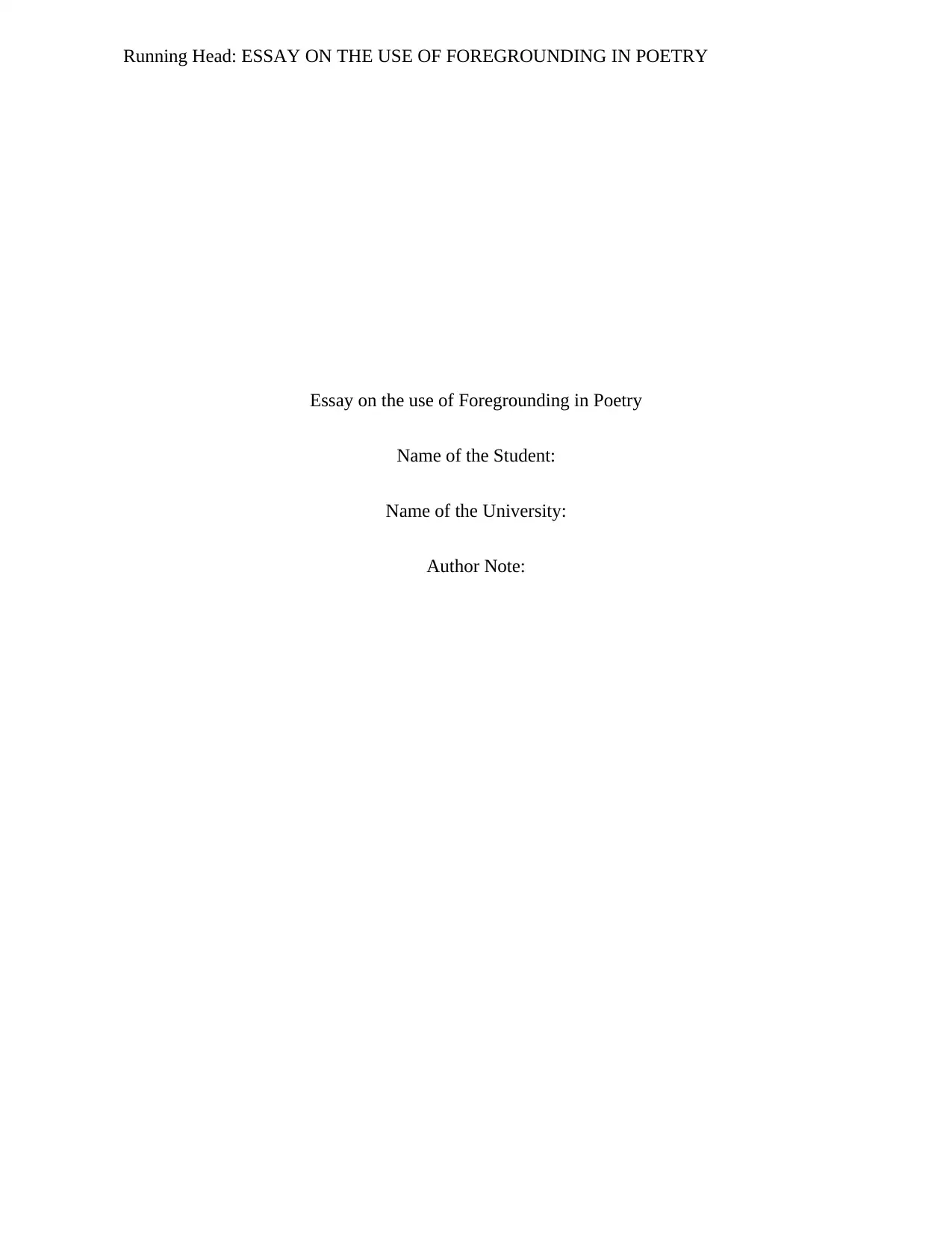
Running Head: ESSAY ON THE USE OF FOREGROUNDING IN POETRY
Essay on the use of Foregrounding in Poetry
Name of the Student:
Name of the University:
Author Note:
Essay on the use of Foregrounding in Poetry
Name of the Student:
Name of the University:
Author Note:
Paraphrase This Document
Need a fresh take? Get an instant paraphrase of this document with our AI Paraphraser
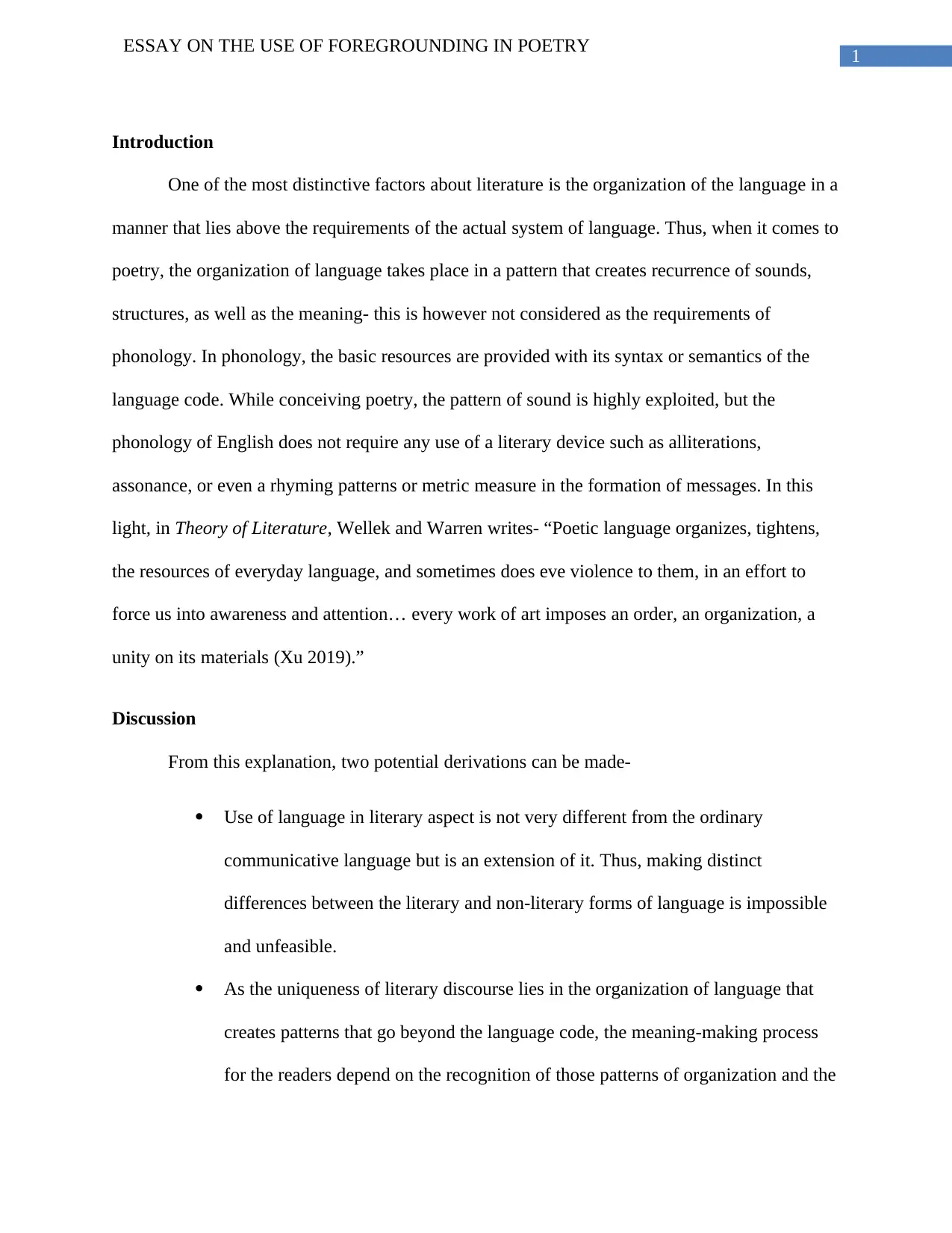
1
ESSAY ON THE USE OF FOREGROUNDING IN POETRY
Introduction
One of the most distinctive factors about literature is the organization of the language in a
manner that lies above the requirements of the actual system of language. Thus, when it comes to
poetry, the organization of language takes place in a pattern that creates recurrence of sounds,
structures, as well as the meaning- this is however not considered as the requirements of
phonology. In phonology, the basic resources are provided with its syntax or semantics of the
language code. While conceiving poetry, the pattern of sound is highly exploited, but the
phonology of English does not require any use of a literary device such as alliterations,
assonance, or even a rhyming patterns or metric measure in the formation of messages. In this
light, in Theory of Literature, Wellek and Warren writes- “Poetic language organizes, tightens,
the resources of everyday language, and sometimes does eve violence to them, in an effort to
force us into awareness and attention… every work of art imposes an order, an organization, a
unity on its materials (Xu 2019).”
Discussion
From this explanation, two potential derivations can be made-
Use of language in literary aspect is not very different from the ordinary
communicative language but is an extension of it. Thus, making distinct
differences between the literary and non-literary forms of language is impossible
and unfeasible.
As the uniqueness of literary discourse lies in the organization of language that
creates patterns that go beyond the language code, the meaning-making process
for the readers depend on the recognition of those patterns of organization and the
ESSAY ON THE USE OF FOREGROUNDING IN POETRY
Introduction
One of the most distinctive factors about literature is the organization of the language in a
manner that lies above the requirements of the actual system of language. Thus, when it comes to
poetry, the organization of language takes place in a pattern that creates recurrence of sounds,
structures, as well as the meaning- this is however not considered as the requirements of
phonology. In phonology, the basic resources are provided with its syntax or semantics of the
language code. While conceiving poetry, the pattern of sound is highly exploited, but the
phonology of English does not require any use of a literary device such as alliterations,
assonance, or even a rhyming patterns or metric measure in the formation of messages. In this
light, in Theory of Literature, Wellek and Warren writes- “Poetic language organizes, tightens,
the resources of everyday language, and sometimes does eve violence to them, in an effort to
force us into awareness and attention… every work of art imposes an order, an organization, a
unity on its materials (Xu 2019).”
Discussion
From this explanation, two potential derivations can be made-
Use of language in literary aspect is not very different from the ordinary
communicative language but is an extension of it. Thus, making distinct
differences between the literary and non-literary forms of language is impossible
and unfeasible.
As the uniqueness of literary discourse lies in the organization of language that
creates patterns that go beyond the language code, the meaning-making process
for the readers depend on the recognition of those patterns of organization and the
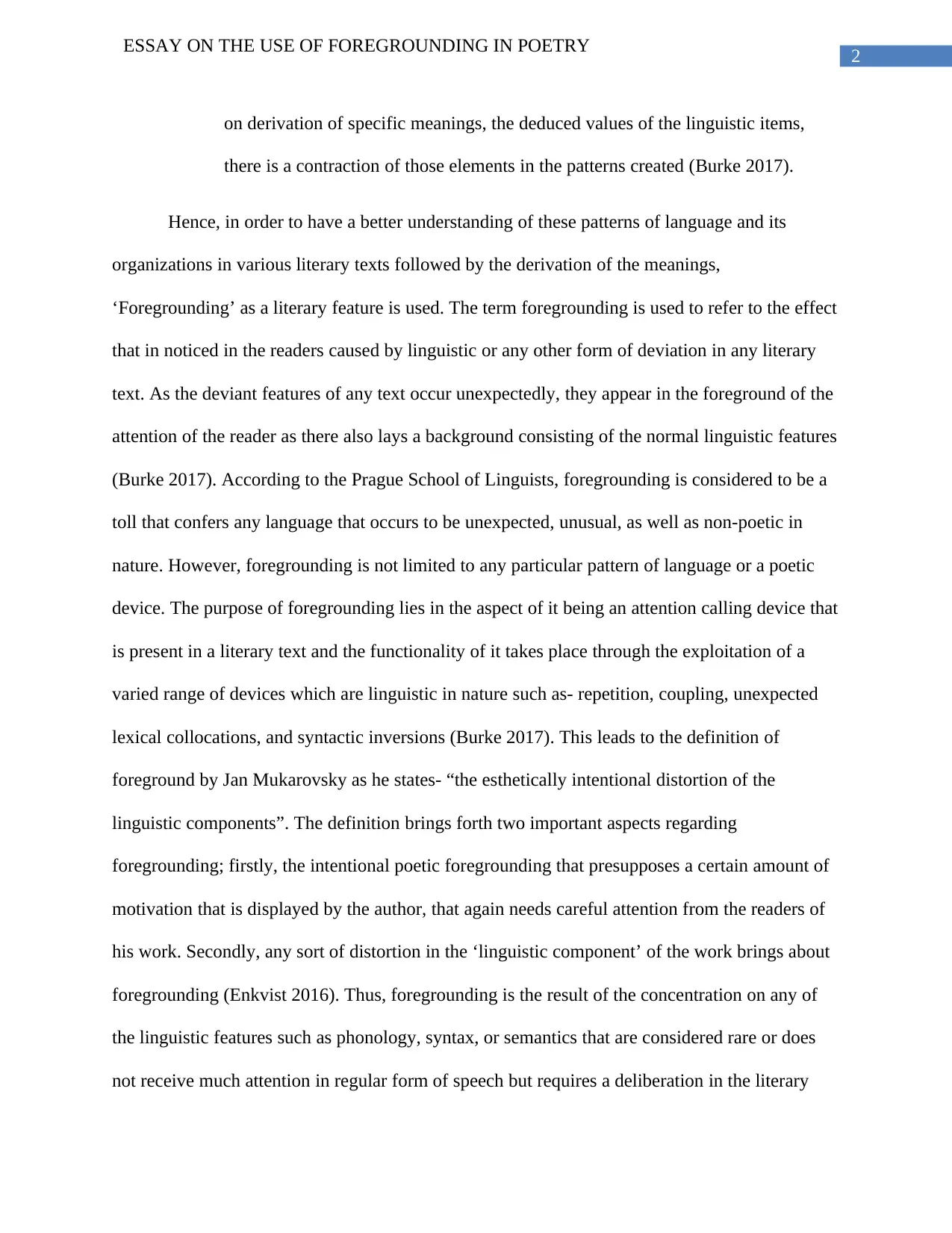
2
ESSAY ON THE USE OF FOREGROUNDING IN POETRY
on derivation of specific meanings, the deduced values of the linguistic items,
there is a contraction of those elements in the patterns created (Burke 2017).
Hence, in order to have a better understanding of these patterns of language and its
organizations in various literary texts followed by the derivation of the meanings,
‘Foregrounding’ as a literary feature is used. The term foregrounding is used to refer to the effect
that in noticed in the readers caused by linguistic or any other form of deviation in any literary
text. As the deviant features of any text occur unexpectedly, they appear in the foreground of the
attention of the reader as there also lays a background consisting of the normal linguistic features
(Burke 2017). According to the Prague School of Linguists, foregrounding is considered to be a
toll that confers any language that occurs to be unexpected, unusual, as well as non-poetic in
nature. However, foregrounding is not limited to any particular pattern of language or a poetic
device. The purpose of foregrounding lies in the aspect of it being an attention calling device that
is present in a literary text and the functionality of it takes place through the exploitation of a
varied range of devices which are linguistic in nature such as- repetition, coupling, unexpected
lexical collocations, and syntactic inversions (Burke 2017). This leads to the definition of
foreground by Jan Mukarovsky as he states- “the esthetically intentional distortion of the
linguistic components”. The definition brings forth two important aspects regarding
foregrounding; firstly, the intentional poetic foregrounding that presupposes a certain amount of
motivation that is displayed by the author, that again needs careful attention from the readers of
his work. Secondly, any sort of distortion in the ‘linguistic component’ of the work brings about
foregrounding (Enkvist 2016). Thus, foregrounding is the result of the concentration on any of
the linguistic features such as phonology, syntax, or semantics that are considered rare or does
not receive much attention in regular form of speech but requires a deliberation in the literary
ESSAY ON THE USE OF FOREGROUNDING IN POETRY
on derivation of specific meanings, the deduced values of the linguistic items,
there is a contraction of those elements in the patterns created (Burke 2017).
Hence, in order to have a better understanding of these patterns of language and its
organizations in various literary texts followed by the derivation of the meanings,
‘Foregrounding’ as a literary feature is used. The term foregrounding is used to refer to the effect
that in noticed in the readers caused by linguistic or any other form of deviation in any literary
text. As the deviant features of any text occur unexpectedly, they appear in the foreground of the
attention of the reader as there also lays a background consisting of the normal linguistic features
(Burke 2017). According to the Prague School of Linguists, foregrounding is considered to be a
toll that confers any language that occurs to be unexpected, unusual, as well as non-poetic in
nature. However, foregrounding is not limited to any particular pattern of language or a poetic
device. The purpose of foregrounding lies in the aspect of it being an attention calling device that
is present in a literary text and the functionality of it takes place through the exploitation of a
varied range of devices which are linguistic in nature such as- repetition, coupling, unexpected
lexical collocations, and syntactic inversions (Burke 2017). This leads to the definition of
foreground by Jan Mukarovsky as he states- “the esthetically intentional distortion of the
linguistic components”. The definition brings forth two important aspects regarding
foregrounding; firstly, the intentional poetic foregrounding that presupposes a certain amount of
motivation that is displayed by the author, that again needs careful attention from the readers of
his work. Secondly, any sort of distortion in the ‘linguistic component’ of the work brings about
foregrounding (Enkvist 2016). Thus, foregrounding is the result of the concentration on any of
the linguistic features such as phonology, syntax, or semantics that are considered rare or does
not receive much attention in regular form of speech but requires a deliberation in the literary
⊘ This is a preview!⊘
Do you want full access?
Subscribe today to unlock all pages.

Trusted by 1+ million students worldwide
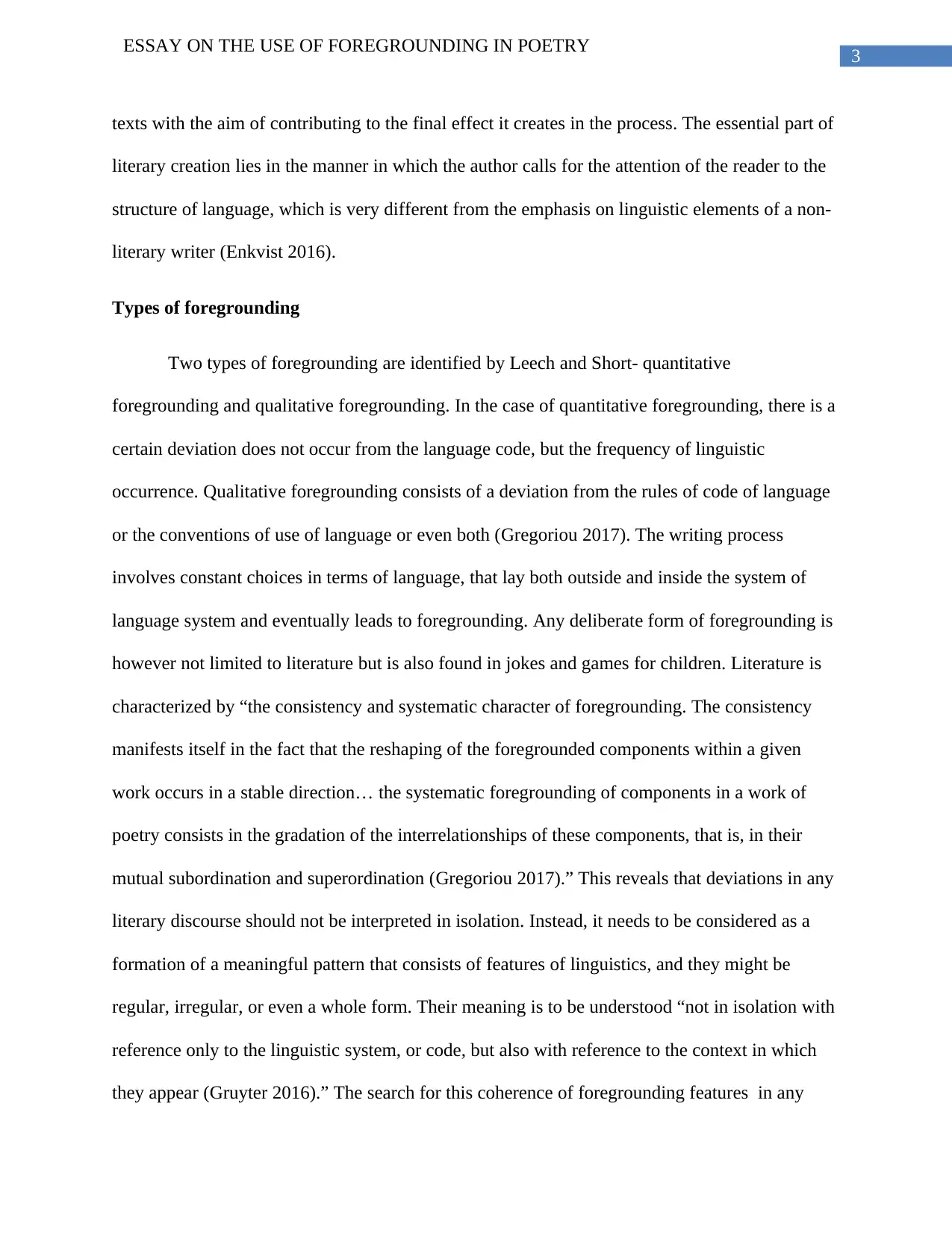
3
ESSAY ON THE USE OF FOREGROUNDING IN POETRY
texts with the aim of contributing to the final effect it creates in the process. The essential part of
literary creation lies in the manner in which the author calls for the attention of the reader to the
structure of language, which is very different from the emphasis on linguistic elements of a non-
literary writer (Enkvist 2016).
Types of foregrounding
Two types of foregrounding are identified by Leech and Short- quantitative
foregrounding and qualitative foregrounding. In the case of quantitative foregrounding, there is a
certain deviation does not occur from the language code, but the frequency of linguistic
occurrence. Qualitative foregrounding consists of a deviation from the rules of code of language
or the conventions of use of language or even both (Gregoriou 2017). The writing process
involves constant choices in terms of language, that lay both outside and inside the system of
language system and eventually leads to foregrounding. Any deliberate form of foregrounding is
however not limited to literature but is also found in jokes and games for children. Literature is
characterized by “the consistency and systematic character of foregrounding. The consistency
manifests itself in the fact that the reshaping of the foregrounded components within a given
work occurs in a stable direction… the systematic foregrounding of components in a work of
poetry consists in the gradation of the interrelationships of these components, that is, in their
mutual subordination and superordination (Gregoriou 2017).” This reveals that deviations in any
literary discourse should not be interpreted in isolation. Instead, it needs to be considered as a
formation of a meaningful pattern that consists of features of linguistics, and they might be
regular, irregular, or even a whole form. Their meaning is to be understood “not in isolation with
reference only to the linguistic system, or code, but also with reference to the context in which
they appear (Gruyter 2016).” The search for this coherence of foregrounding features in any
ESSAY ON THE USE OF FOREGROUNDING IN POETRY
texts with the aim of contributing to the final effect it creates in the process. The essential part of
literary creation lies in the manner in which the author calls for the attention of the reader to the
structure of language, which is very different from the emphasis on linguistic elements of a non-
literary writer (Enkvist 2016).
Types of foregrounding
Two types of foregrounding are identified by Leech and Short- quantitative
foregrounding and qualitative foregrounding. In the case of quantitative foregrounding, there is a
certain deviation does not occur from the language code, but the frequency of linguistic
occurrence. Qualitative foregrounding consists of a deviation from the rules of code of language
or the conventions of use of language or even both (Gregoriou 2017). The writing process
involves constant choices in terms of language, that lay both outside and inside the system of
language system and eventually leads to foregrounding. Any deliberate form of foregrounding is
however not limited to literature but is also found in jokes and games for children. Literature is
characterized by “the consistency and systematic character of foregrounding. The consistency
manifests itself in the fact that the reshaping of the foregrounded components within a given
work occurs in a stable direction… the systematic foregrounding of components in a work of
poetry consists in the gradation of the interrelationships of these components, that is, in their
mutual subordination and superordination (Gregoriou 2017).” This reveals that deviations in any
literary discourse should not be interpreted in isolation. Instead, it needs to be considered as a
formation of a meaningful pattern that consists of features of linguistics, and they might be
regular, irregular, or even a whole form. Their meaning is to be understood “not in isolation with
reference only to the linguistic system, or code, but also with reference to the context in which
they appear (Gruyter 2016).” The search for this coherence of foregrounding features in any
Paraphrase This Document
Need a fresh take? Get an instant paraphrase of this document with our AI Paraphraser
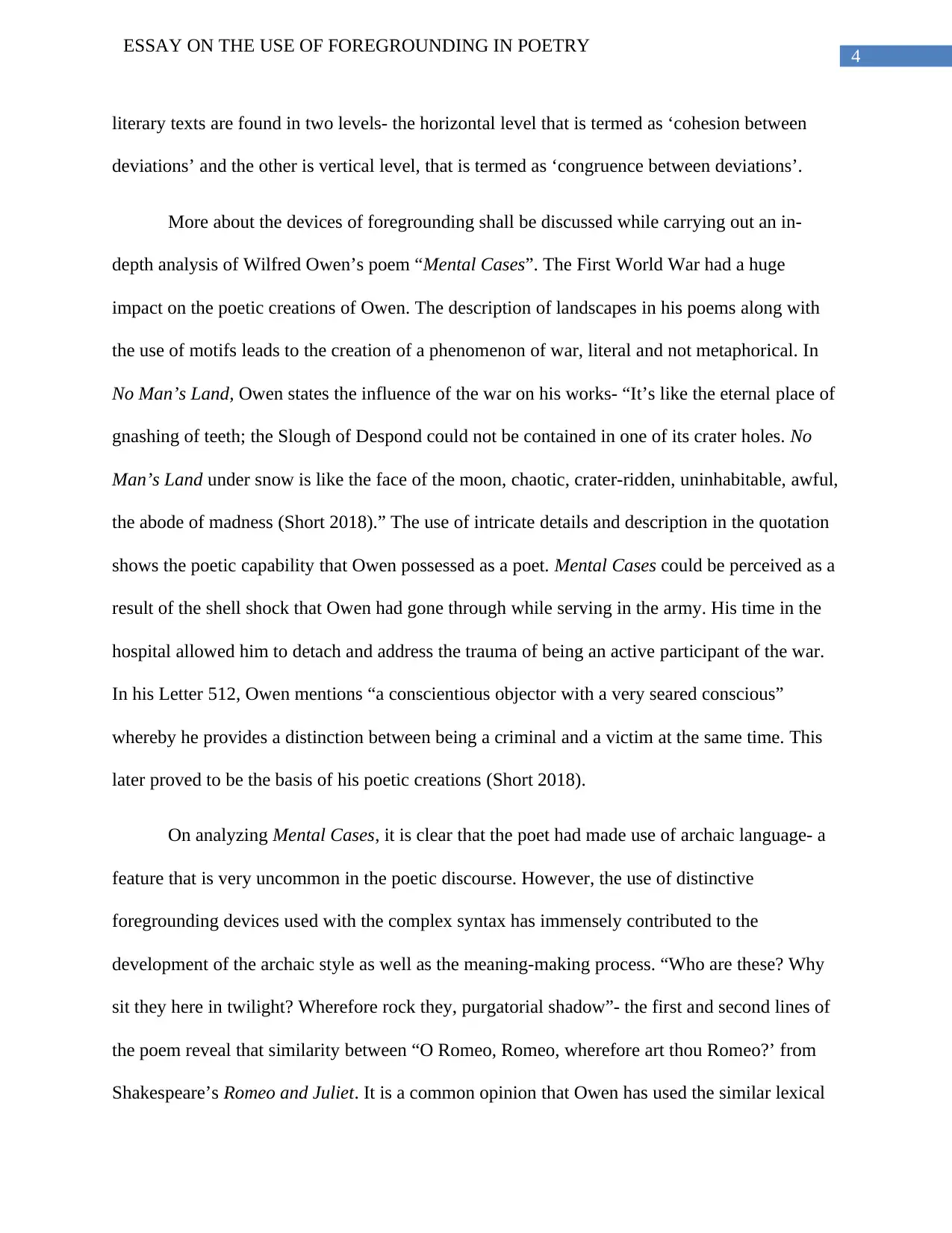
4
ESSAY ON THE USE OF FOREGROUNDING IN POETRY
literary texts are found in two levels- the horizontal level that is termed as ‘cohesion between
deviations’ and the other is vertical level, that is termed as ‘congruence between deviations’.
More about the devices of foregrounding shall be discussed while carrying out an in-
depth analysis of Wilfred Owen’s poem “Mental Cases”. The First World War had a huge
impact on the poetic creations of Owen. The description of landscapes in his poems along with
the use of motifs leads to the creation of a phenomenon of war, literal and not metaphorical. In
No Man’s Land, Owen states the influence of the war on his works- “It’s like the eternal place of
gnashing of teeth; the Slough of Despond could not be contained in one of its crater holes. No
Man’s Land under snow is like the face of the moon, chaotic, crater-ridden, uninhabitable, awful,
the abode of madness (Short 2018).” The use of intricate details and description in the quotation
shows the poetic capability that Owen possessed as a poet. Mental Cases could be perceived as a
result of the shell shock that Owen had gone through while serving in the army. His time in the
hospital allowed him to detach and address the trauma of being an active participant of the war.
In his Letter 512, Owen mentions “a conscientious objector with a very seared conscious”
whereby he provides a distinction between being a criminal and a victim at the same time. This
later proved to be the basis of his poetic creations (Short 2018).
On analyzing Mental Cases, it is clear that the poet had made use of archaic language- a
feature that is very uncommon in the poetic discourse. However, the use of distinctive
foregrounding devices used with the complex syntax has immensely contributed to the
development of the archaic style as well as the meaning-making process. “Who are these? Why
sit they here in twilight? Wherefore rock they, purgatorial shadow”- the first and second lines of
the poem reveal that similarity between “O Romeo, Romeo, wherefore art thou Romeo?’ from
Shakespeare’s Romeo and Juliet. It is a common opinion that Owen has used the similar lexical
ESSAY ON THE USE OF FOREGROUNDING IN POETRY
literary texts are found in two levels- the horizontal level that is termed as ‘cohesion between
deviations’ and the other is vertical level, that is termed as ‘congruence between deviations’.
More about the devices of foregrounding shall be discussed while carrying out an in-
depth analysis of Wilfred Owen’s poem “Mental Cases”. The First World War had a huge
impact on the poetic creations of Owen. The description of landscapes in his poems along with
the use of motifs leads to the creation of a phenomenon of war, literal and not metaphorical. In
No Man’s Land, Owen states the influence of the war on his works- “It’s like the eternal place of
gnashing of teeth; the Slough of Despond could not be contained in one of its crater holes. No
Man’s Land under snow is like the face of the moon, chaotic, crater-ridden, uninhabitable, awful,
the abode of madness (Short 2018).” The use of intricate details and description in the quotation
shows the poetic capability that Owen possessed as a poet. Mental Cases could be perceived as a
result of the shell shock that Owen had gone through while serving in the army. His time in the
hospital allowed him to detach and address the trauma of being an active participant of the war.
In his Letter 512, Owen mentions “a conscientious objector with a very seared conscious”
whereby he provides a distinction between being a criminal and a victim at the same time. This
later proved to be the basis of his poetic creations (Short 2018).
On analyzing Mental Cases, it is clear that the poet had made use of archaic language- a
feature that is very uncommon in the poetic discourse. However, the use of distinctive
foregrounding devices used with the complex syntax has immensely contributed to the
development of the archaic style as well as the meaning-making process. “Who are these? Why
sit they here in twilight? Wherefore rock they, purgatorial shadow”- the first and second lines of
the poem reveal that similarity between “O Romeo, Romeo, wherefore art thou Romeo?’ from
Shakespeare’s Romeo and Juliet. It is a common opinion that Owen has used the similar lexical
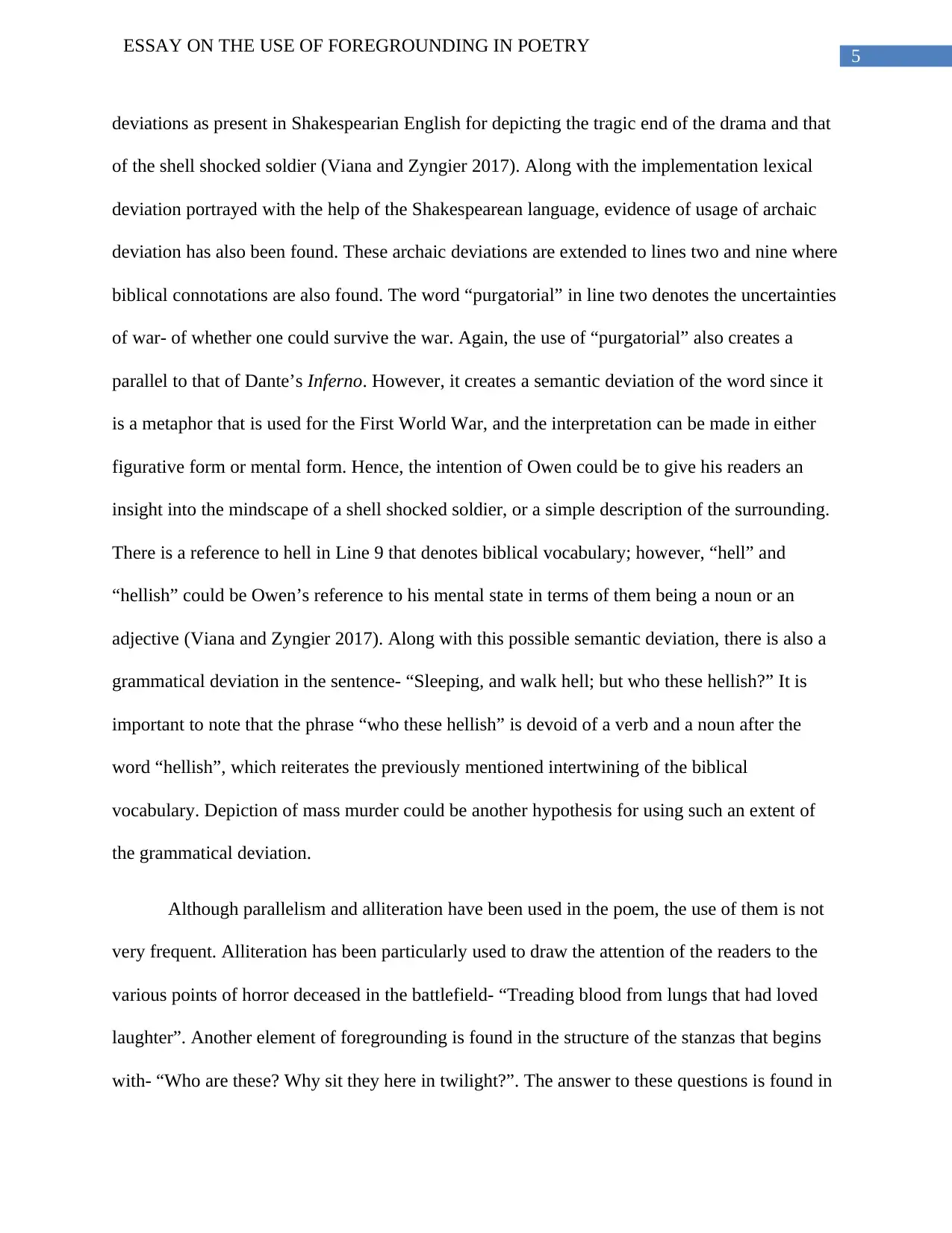
5
ESSAY ON THE USE OF FOREGROUNDING IN POETRY
deviations as present in Shakespearian English for depicting the tragic end of the drama and that
of the shell shocked soldier (Viana and Zyngier 2017). Along with the implementation lexical
deviation portrayed with the help of the Shakespearean language, evidence of usage of archaic
deviation has also been found. These archaic deviations are extended to lines two and nine where
biblical connotations are also found. The word “purgatorial” in line two denotes the uncertainties
of war- of whether one could survive the war. Again, the use of “purgatorial” also creates a
parallel to that of Dante’s Inferno. However, it creates a semantic deviation of the word since it
is a metaphor that is used for the First World War, and the interpretation can be made in either
figurative form or mental form. Hence, the intention of Owen could be to give his readers an
insight into the mindscape of a shell shocked soldier, or a simple description of the surrounding.
There is a reference to hell in Line 9 that denotes biblical vocabulary; however, “hell” and
“hellish” could be Owen’s reference to his mental state in terms of them being a noun or an
adjective (Viana and Zyngier 2017). Along with this possible semantic deviation, there is also a
grammatical deviation in the sentence- “Sleeping, and walk hell; but who these hellish?” It is
important to note that the phrase “who these hellish” is devoid of a verb and a noun after the
word “hellish”, which reiterates the previously mentioned intertwining of the biblical
vocabulary. Depiction of mass murder could be another hypothesis for using such an extent of
the grammatical deviation.
Although parallelism and alliteration have been used in the poem, the use of them is not
very frequent. Alliteration has been particularly used to draw the attention of the readers to the
various points of horror deceased in the battlefield- “Treading blood from lungs that had loved
laughter”. Another element of foregrounding is found in the structure of the stanzas that begins
with- “Who are these? Why sit they here in twilight?”. The answer to these questions is found in
ESSAY ON THE USE OF FOREGROUNDING IN POETRY
deviations as present in Shakespearian English for depicting the tragic end of the drama and that
of the shell shocked soldier (Viana and Zyngier 2017). Along with the implementation lexical
deviation portrayed with the help of the Shakespearean language, evidence of usage of archaic
deviation has also been found. These archaic deviations are extended to lines two and nine where
biblical connotations are also found. The word “purgatorial” in line two denotes the uncertainties
of war- of whether one could survive the war. Again, the use of “purgatorial” also creates a
parallel to that of Dante’s Inferno. However, it creates a semantic deviation of the word since it
is a metaphor that is used for the First World War, and the interpretation can be made in either
figurative form or mental form. Hence, the intention of Owen could be to give his readers an
insight into the mindscape of a shell shocked soldier, or a simple description of the surrounding.
There is a reference to hell in Line 9 that denotes biblical vocabulary; however, “hell” and
“hellish” could be Owen’s reference to his mental state in terms of them being a noun or an
adjective (Viana and Zyngier 2017). Along with this possible semantic deviation, there is also a
grammatical deviation in the sentence- “Sleeping, and walk hell; but who these hellish?” It is
important to note that the phrase “who these hellish” is devoid of a verb and a noun after the
word “hellish”, which reiterates the previously mentioned intertwining of the biblical
vocabulary. Depiction of mass murder could be another hypothesis for using such an extent of
the grammatical deviation.
Although parallelism and alliteration have been used in the poem, the use of them is not
very frequent. Alliteration has been particularly used to draw the attention of the readers to the
various points of horror deceased in the battlefield- “Treading blood from lungs that had loved
laughter”. Another element of foregrounding is found in the structure of the stanzas that begins
with- “Who are these? Why sit they here in twilight?”. The answer to these questions is found in
⊘ This is a preview!⊘
Do you want full access?
Subscribe today to unlock all pages.

Trusted by 1+ million students worldwide
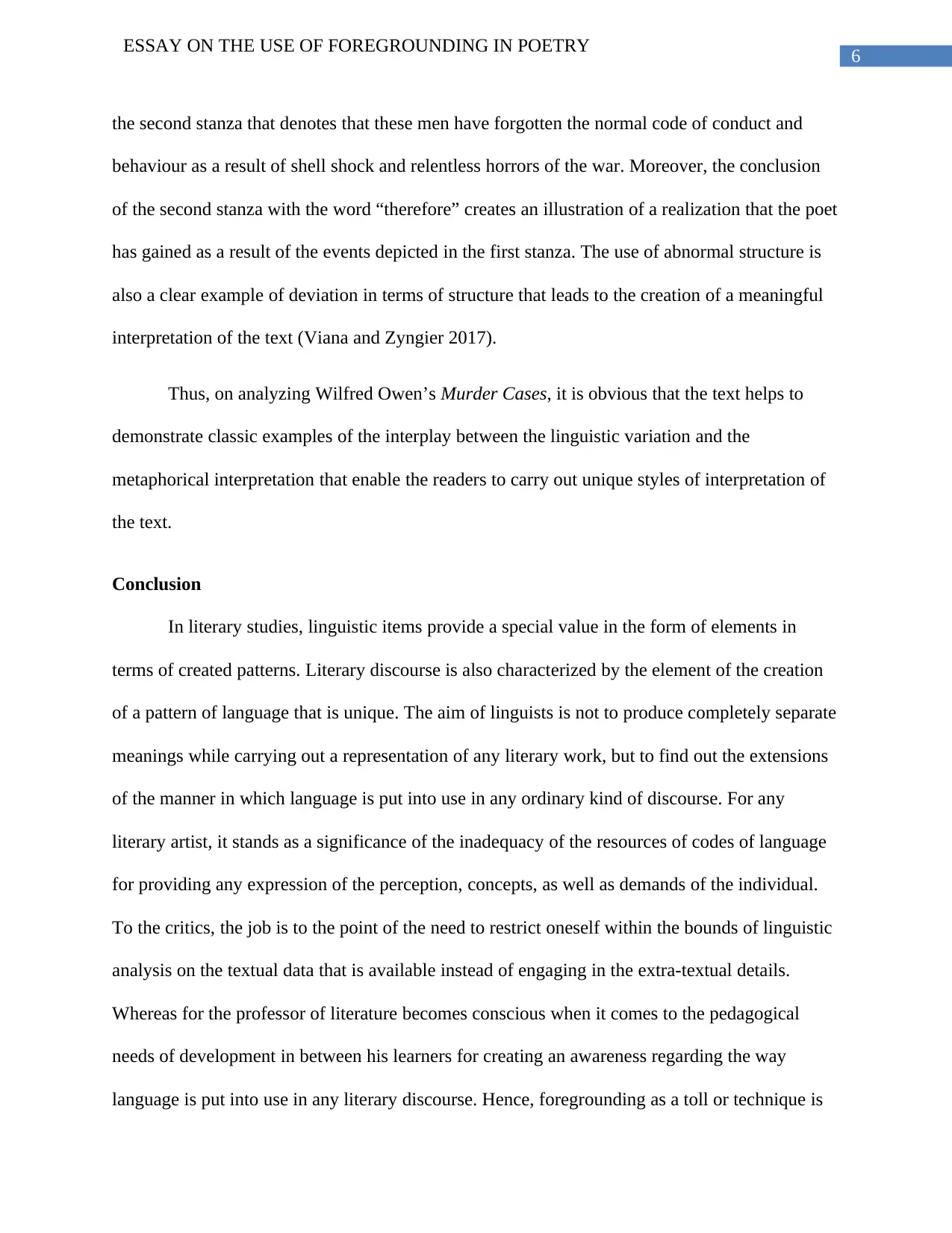
6
ESSAY ON THE USE OF FOREGROUNDING IN POETRY
the second stanza that denotes that these men have forgotten the normal code of conduct and
behaviour as a result of shell shock and relentless horrors of the war. Moreover, the conclusion
of the second stanza with the word “therefore” creates an illustration of a realization that the poet
has gained as a result of the events depicted in the first stanza. The use of abnormal structure is
also a clear example of deviation in terms of structure that leads to the creation of a meaningful
interpretation of the text (Viana and Zyngier 2017).
Thus, on analyzing Wilfred Owen’s Murder Cases, it is obvious that the text helps to
demonstrate classic examples of the interplay between the linguistic variation and the
metaphorical interpretation that enable the readers to carry out unique styles of interpretation of
the text.
Conclusion
In literary studies, linguistic items provide a special value in the form of elements in
terms of created patterns. Literary discourse is also characterized by the element of the creation
of a pattern of language that is unique. The aim of linguists is not to produce completely separate
meanings while carrying out a representation of any literary work, but to find out the extensions
of the manner in which language is put into use in any ordinary kind of discourse. For any
literary artist, it stands as a significance of the inadequacy of the resources of codes of language
for providing any expression of the perception, concepts, as well as demands of the individual.
To the critics, the job is to the point of the need to restrict oneself within the bounds of linguistic
analysis on the textual data that is available instead of engaging in the extra-textual details.
Whereas for the professor of literature becomes conscious when it comes to the pedagogical
needs of development in between his learners for creating an awareness regarding the way
language is put into use in any literary discourse. Hence, foregrounding as a toll or technique is
ESSAY ON THE USE OF FOREGROUNDING IN POETRY
the second stanza that denotes that these men have forgotten the normal code of conduct and
behaviour as a result of shell shock and relentless horrors of the war. Moreover, the conclusion
of the second stanza with the word “therefore” creates an illustration of a realization that the poet
has gained as a result of the events depicted in the first stanza. The use of abnormal structure is
also a clear example of deviation in terms of structure that leads to the creation of a meaningful
interpretation of the text (Viana and Zyngier 2017).
Thus, on analyzing Wilfred Owen’s Murder Cases, it is obvious that the text helps to
demonstrate classic examples of the interplay between the linguistic variation and the
metaphorical interpretation that enable the readers to carry out unique styles of interpretation of
the text.
Conclusion
In literary studies, linguistic items provide a special value in the form of elements in
terms of created patterns. Literary discourse is also characterized by the element of the creation
of a pattern of language that is unique. The aim of linguists is not to produce completely separate
meanings while carrying out a representation of any literary work, but to find out the extensions
of the manner in which language is put into use in any ordinary kind of discourse. For any
literary artist, it stands as a significance of the inadequacy of the resources of codes of language
for providing any expression of the perception, concepts, as well as demands of the individual.
To the critics, the job is to the point of the need to restrict oneself within the bounds of linguistic
analysis on the textual data that is available instead of engaging in the extra-textual details.
Whereas for the professor of literature becomes conscious when it comes to the pedagogical
needs of development in between his learners for creating an awareness regarding the way
language is put into use in any literary discourse. Hence, foregrounding as a toll or technique is
Paraphrase This Document
Need a fresh take? Get an instant paraphrase of this document with our AI Paraphraser
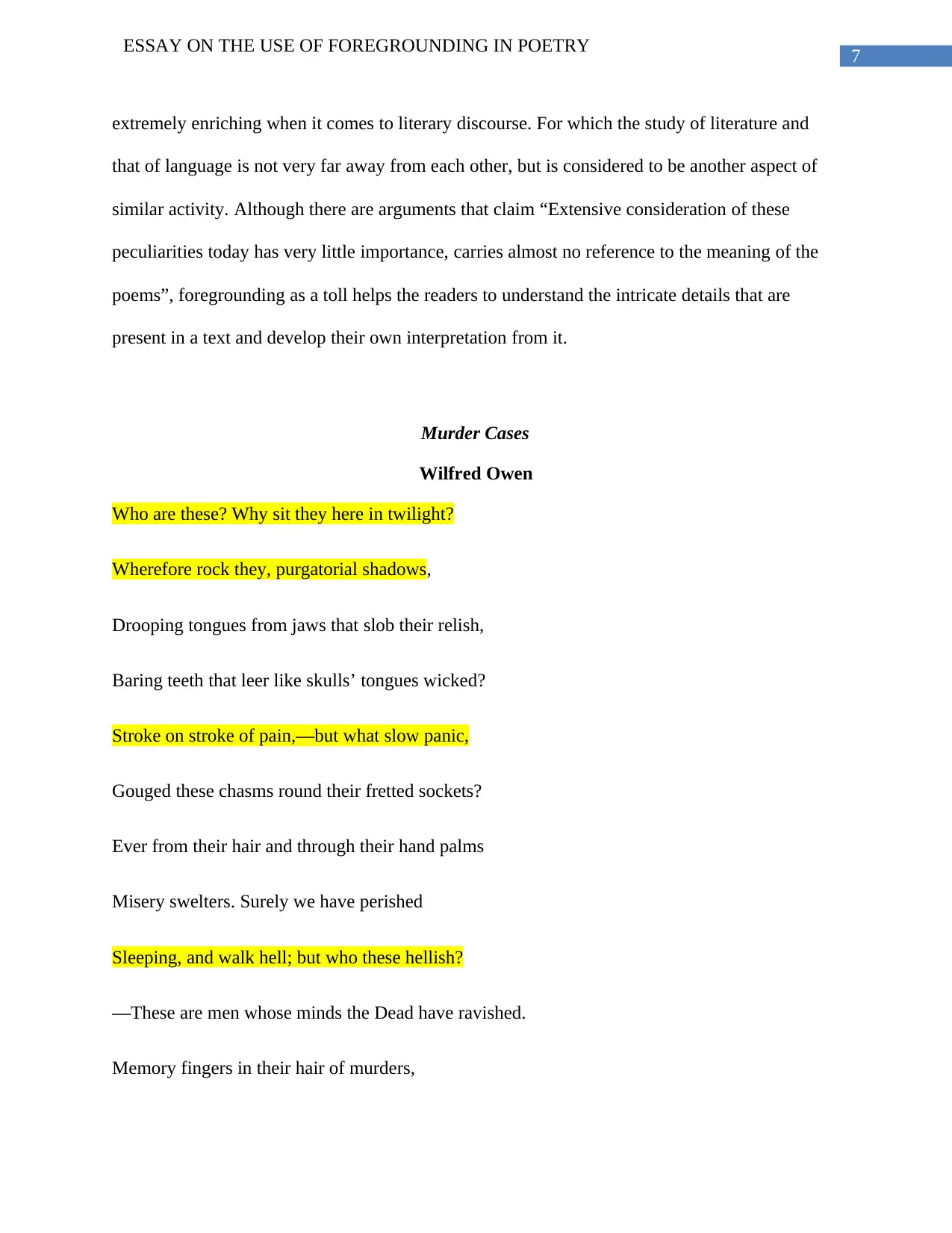
7
ESSAY ON THE USE OF FOREGROUNDING IN POETRY
extremely enriching when it comes to literary discourse. For which the study of literature and
that of language is not very far away from each other, but is considered to be another aspect of
similar activity. Although there are arguments that claim “Extensive consideration of these
peculiarities today has very little importance, carries almost no reference to the meaning of the
poems”, foregrounding as a toll helps the readers to understand the intricate details that are
present in a text and develop their own interpretation from it.
Murder Cases
Wilfred Owen
Who are these? Why sit they here in twilight?
Wherefore rock they, purgatorial shadows,
Drooping tongues from jaws that slob their relish,
Baring teeth that leer like skulls’ tongues wicked?
Stroke on stroke of pain,—but what slow panic,
Gouged these chasms round their fretted sockets?
Ever from their hair and through their hand palms
Misery swelters. Surely we have perished
Sleeping, and walk hell; but who these hellish?
—These are men whose minds the Dead have ravished.
Memory fingers in their hair of murders,
ESSAY ON THE USE OF FOREGROUNDING IN POETRY
extremely enriching when it comes to literary discourse. For which the study of literature and
that of language is not very far away from each other, but is considered to be another aspect of
similar activity. Although there are arguments that claim “Extensive consideration of these
peculiarities today has very little importance, carries almost no reference to the meaning of the
poems”, foregrounding as a toll helps the readers to understand the intricate details that are
present in a text and develop their own interpretation from it.
Murder Cases
Wilfred Owen
Who are these? Why sit they here in twilight?
Wherefore rock they, purgatorial shadows,
Drooping tongues from jaws that slob their relish,
Baring teeth that leer like skulls’ tongues wicked?
Stroke on stroke of pain,—but what slow panic,
Gouged these chasms round their fretted sockets?
Ever from their hair and through their hand palms
Misery swelters. Surely we have perished
Sleeping, and walk hell; but who these hellish?
—These are men whose minds the Dead have ravished.
Memory fingers in their hair of murders,
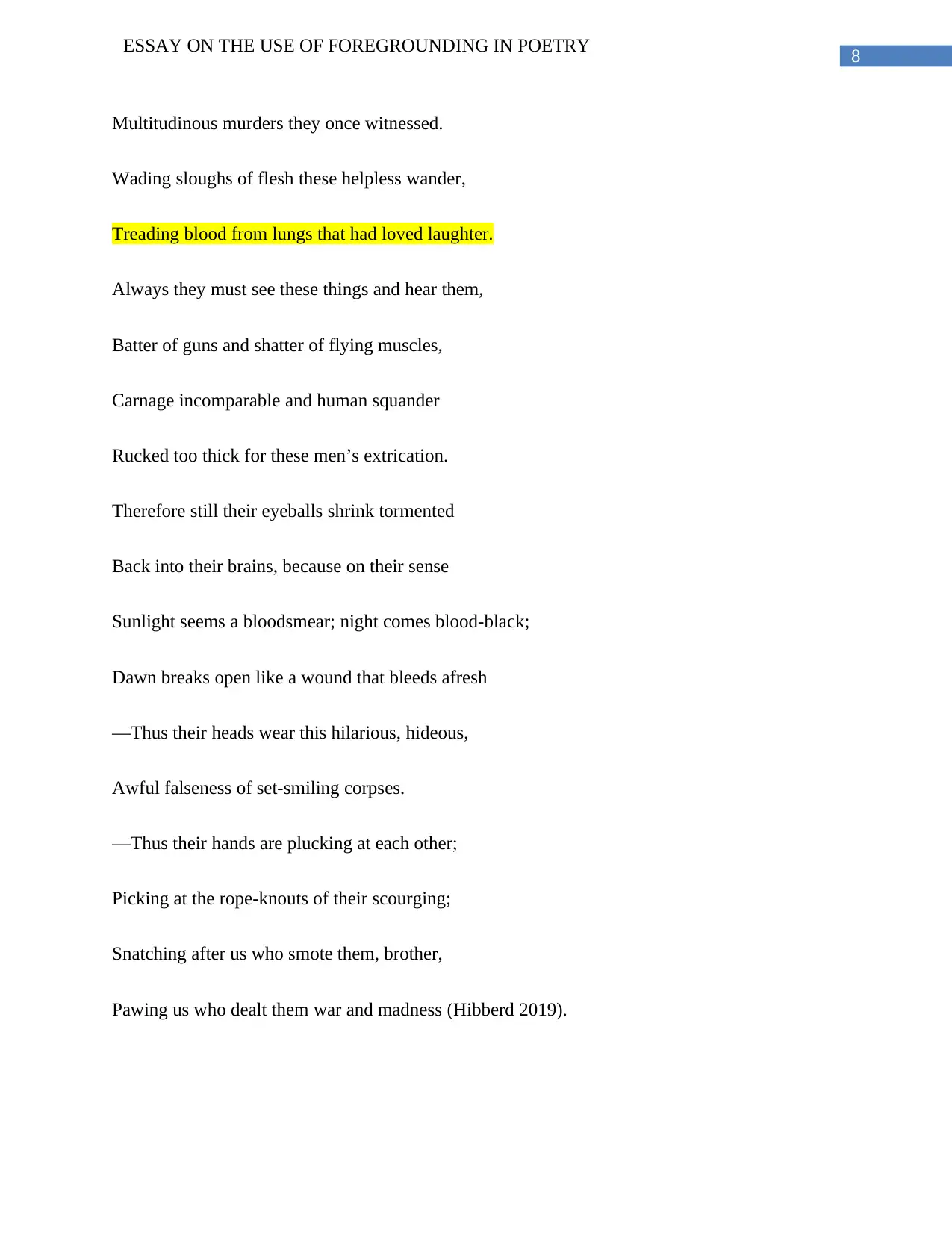
8
ESSAY ON THE USE OF FOREGROUNDING IN POETRY
Multitudinous murders they once witnessed.
Wading sloughs of flesh these helpless wander,
Treading blood from lungs that had loved laughter.
Always they must see these things and hear them,
Batter of guns and shatter of flying muscles,
Carnage incomparable and human squander
Rucked too thick for these men’s extrication.
Therefore still their eyeballs shrink tormented
Back into their brains, because on their sense
Sunlight seems a bloodsmear; night comes blood-black;
Dawn breaks open like a wound that bleeds afresh
—Thus their heads wear this hilarious, hideous,
Awful falseness of set-smiling corpses.
—Thus their hands are plucking at each other;
Picking at the rope-knouts of their scourging;
Snatching after us who smote them, brother,
Pawing us who dealt them war and madness (Hibberd 2019).
ESSAY ON THE USE OF FOREGROUNDING IN POETRY
Multitudinous murders they once witnessed.
Wading sloughs of flesh these helpless wander,
Treading blood from lungs that had loved laughter.
Always they must see these things and hear them,
Batter of guns and shatter of flying muscles,
Carnage incomparable and human squander
Rucked too thick for these men’s extrication.
Therefore still their eyeballs shrink tormented
Back into their brains, because on their sense
Sunlight seems a bloodsmear; night comes blood-black;
Dawn breaks open like a wound that bleeds afresh
—Thus their heads wear this hilarious, hideous,
Awful falseness of set-smiling corpses.
—Thus their hands are plucking at each other;
Picking at the rope-knouts of their scourging;
Snatching after us who smote them, brother,
Pawing us who dealt them war and madness (Hibberd 2019).
⊘ This is a preview!⊘
Do you want full access?
Subscribe today to unlock all pages.

Trusted by 1+ million students worldwide
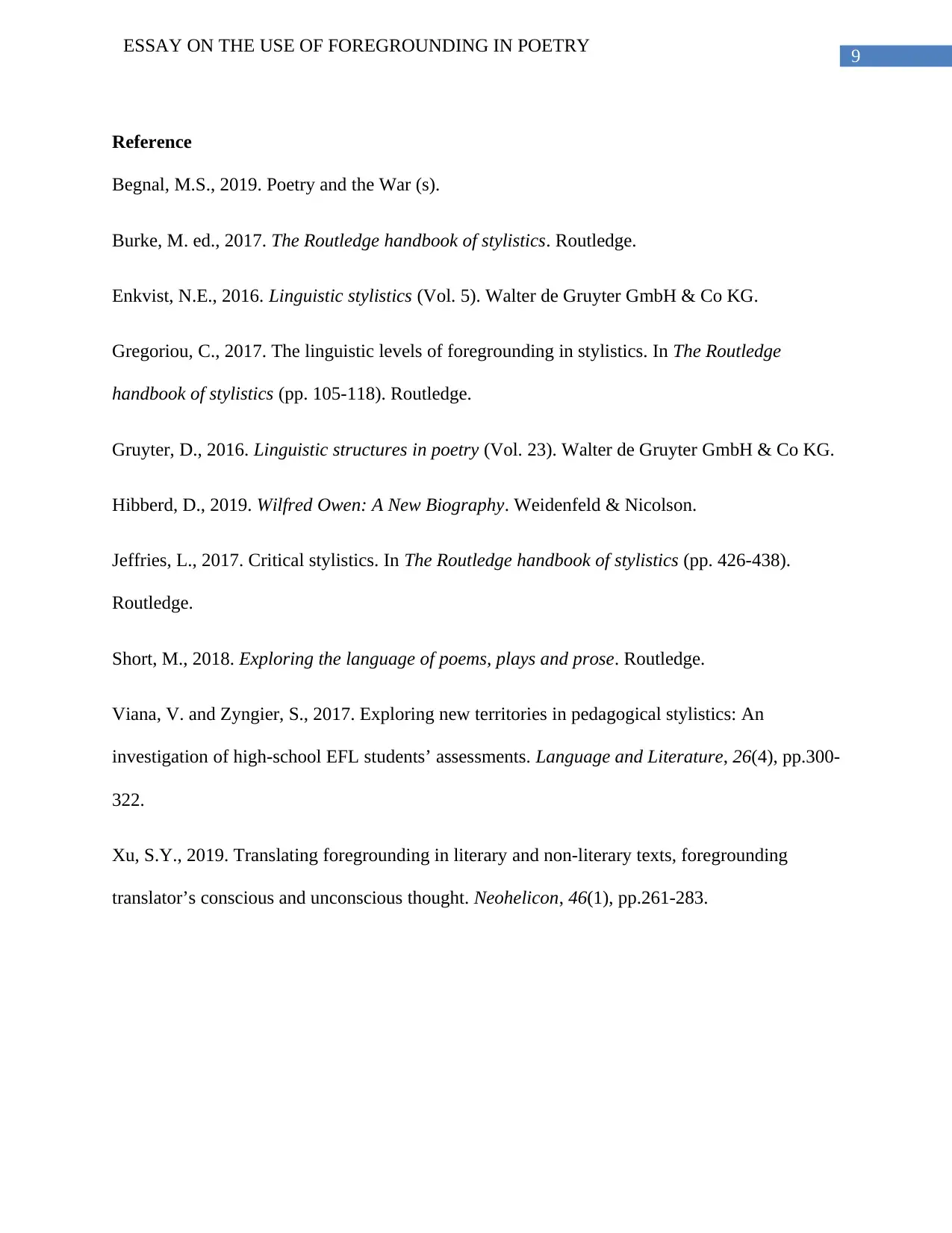
9
ESSAY ON THE USE OF FOREGROUNDING IN POETRY
Reference
Begnal, M.S., 2019. Poetry and the War (s).
Burke, M. ed., 2017. The Routledge handbook of stylistics. Routledge.
Enkvist, N.E., 2016. Linguistic stylistics (Vol. 5). Walter de Gruyter GmbH & Co KG.
Gregoriou, C., 2017. The linguistic levels of foregrounding in stylistics. In The Routledge
handbook of stylistics (pp. 105-118). Routledge.
Gruyter, D., 2016. Linguistic structures in poetry (Vol. 23). Walter de Gruyter GmbH & Co KG.
Hibberd, D., 2019. Wilfred Owen: A New Biography. Weidenfeld & Nicolson.
Jeffries, L., 2017. Critical stylistics. In The Routledge handbook of stylistics (pp. 426-438).
Routledge.
Short, M., 2018. Exploring the language of poems, plays and prose. Routledge.
Viana, V. and Zyngier, S., 2017. Exploring new territories in pedagogical stylistics: An
investigation of high-school EFL students’ assessments. Language and Literature, 26(4), pp.300-
322.
Xu, S.Y., 2019. Translating foregrounding in literary and non-literary texts, foregrounding
translator’s conscious and unconscious thought. Neohelicon, 46(1), pp.261-283.
ESSAY ON THE USE OF FOREGROUNDING IN POETRY
Reference
Begnal, M.S., 2019. Poetry and the War (s).
Burke, M. ed., 2017. The Routledge handbook of stylistics. Routledge.
Enkvist, N.E., 2016. Linguistic stylistics (Vol. 5). Walter de Gruyter GmbH & Co KG.
Gregoriou, C., 2017. The linguistic levels of foregrounding in stylistics. In The Routledge
handbook of stylistics (pp. 105-118). Routledge.
Gruyter, D., 2016. Linguistic structures in poetry (Vol. 23). Walter de Gruyter GmbH & Co KG.
Hibberd, D., 2019. Wilfred Owen: A New Biography. Weidenfeld & Nicolson.
Jeffries, L., 2017. Critical stylistics. In The Routledge handbook of stylistics (pp. 426-438).
Routledge.
Short, M., 2018. Exploring the language of poems, plays and prose. Routledge.
Viana, V. and Zyngier, S., 2017. Exploring new territories in pedagogical stylistics: An
investigation of high-school EFL students’ assessments. Language and Literature, 26(4), pp.300-
322.
Xu, S.Y., 2019. Translating foregrounding in literary and non-literary texts, foregrounding
translator’s conscious and unconscious thought. Neohelicon, 46(1), pp.261-283.
1 out of 10
Your All-in-One AI-Powered Toolkit for Academic Success.
+13062052269
info@desklib.com
Available 24*7 on WhatsApp / Email
![[object Object]](/_next/static/media/star-bottom.7253800d.svg)
Unlock your academic potential
Copyright © 2020–2026 A2Z Services. All Rights Reserved. Developed and managed by ZUCOL.